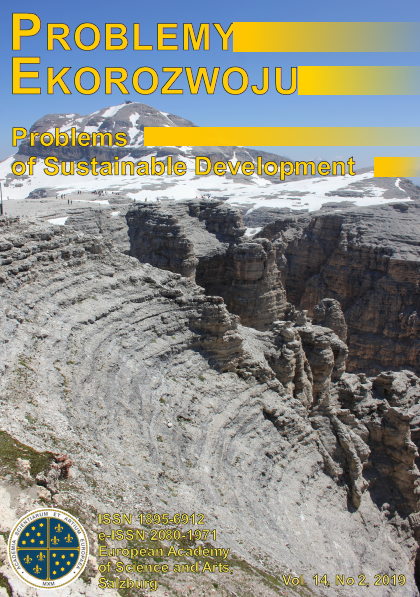Sustainable Development – Utopia or Implementation Possibilities?
Article Sidebar
Issue Vol. 14 No. 2 (2019)
-
Assessment of Sustainable Development Using Cluster Analysis and Principal Component Analysis
Magdaléna Drastichová, Peter Filzmoser7-24
-
For Further Social Development, Peaceful, Safe and Useful for People
Wiesław Sztumski25-32
-
Sustainability Challenges in Energy Use Behaviour in Households: Comparative Review of Selected Survey-based Publications from Developed and Developing Countries
Tore Johansson, Pedram Pirouzfar33-44
-
Disadvantages Connected With the Development of Tourism in the Contemporary World and the Concept of Sustainable Tourism
Katarzyna Podhorodecka, Anna Dudek45-55
-
Social Justice and Sustainable Development
Mayavee Singh57-62
-
Looking at the Impacts of Income Inequality on Environmental Governance in China
Yao Bo Shi, Xin Xin Zhao, Chyi-Lu Jang, Qiang Fu, Chun-Ping Chang63-70
-
Bioeconomy – Opportunities and Dilemmas in the Context of Human Rights Protection and Environmental Resource Management
Piotr Krajewski71-79
-
Current Challenges of Sustainable Rural Development in Russia: Trends and Prospects
Aleksey Anisimov, Olga Popova, Valentina Ustyukova81-90
-
The Concept of Human Needs in Sustainable Development of Cities
Jolanta Rodzoś91-99
-
An Empirical Comparison of Environmental Behaviors in China’s Public and Private Sectors
Yu Yang, Shizhi Huang, Xingting Huang101-110
-
Sustainable Development – Utopia or Implementation Possibilities?
Paweł Bukrejewski, Anna Latawiec, Anna Matuszewska111-116
-
Implementing Sustainability in Global Supply Chain
Krishnendu Shaw117-127
-
Sustainable Development versus Gender Gap – Do Women Matter?
Ada Domańska, Beata Żukowska, Robert Zajkowski129-142
-
Deep Neural Networks for Curbing Climate Change-Induced Farmers-Herdsmen Clashes in a Sustainable Social Inclusion Initiative
Emmanuel Okewu, Sanjay Misra, Luis Fernandez Sanz, Foluso Ayeni, Victor Mbarika, Robertas Damaševičius143-155
-
Pro-environmental Behaviours in Hotels in the COntext of Sustainable Development of Tourism – Barriers to Shaping and Recommendations for Further Research
Marek Bugdol, Daniel Puciato, Tadeusz Borys157-170
-
Health Evaluation of R&D and Transformation Functional Platform
Yuhong Cao, Jianxin You, Yongjiang Shi, Wei Hu171-182
-
Violence on the Natural Environment
Joanna Kostecka, Kevin R. Butt183-189
-
Comparative Assessment and Obstacles in the Advancement of Renewable Energy in India and China
Pankaj Kumar, Himanshu Sharma, Nitai Pal, Pradip Kumar Sadhu183-189
-
Golden Age Population, Healthy Environment, Growth and Poverty: Are Malaysia Really in a Sustainable Condition?
Nanthakumar Loganathan, Lekha Kunju Pillai Laxman, Abbas Mardani, Dalia Streimikiene, Asan Ali Golam Hassan201-212
-
Pope Francis’s Proposition of Integral Ecology
Krzysztof Bochenek213-220
Archives
-
Vol. 16 No. 2
2021-07-01 26
-
Vol. 16 No. 1
2021-01-04 24
-
Vol. 15 No. 2
2020-07-01 24
-
Vol. 15 No. 1
2020-01-02 24
-
Vol. 14 No. 2
2019-07-01 20
-
Vol. 14 No. 1
2019-01-02 20
-
Vol. 13 No. 2
2023-10-15 22
-
Vol. 13 No. 1
2018-01-02 23
-
Vol. 12 No. 2
2017-07-03 18
-
Vol. 12 No. 1
2017-01-02 16
Main Article Content
Authors
Abstract
The paper contains deliberations concerning the concept of sustainable development and utopia. The concept of utopia explains different perceptions of utopia, also from the historical point of view. Utopia usually brings negative associations because in the past it comprised unreal ideas presented in a simplified way and unattainable. Currently, the concept of utopia is presented as the necessity to introduce changes which have to be supported with action and cannot only be treated as dreams. You should be aware of opportunities and impossibilities of changing the reality when you do not agree with its functioning.
The second subchapter attempts to answer the question whether the sustainable development idea is a new utopia. The authors of the sustainable development idea do not present the vision of a better world which would replace the reality. They look for mechanisms which would allow their gradual implementation because it is not about a perfect world but about creating a holistic reality model. Therefore, the sustainable development idea means rather a plan of changes and not utopia.
The presented plans include the Earth Summit Resolutions and 27 rules of the Rio Declaration (1992). Their content is presented in the third subchapter of the article. Implementation of those resolutions and rules was assessed critically because it is suspected that they constitute a cover for the elites who desire power and that this is utopia used as a social manipulation tool.
Therefore, the sustainable development idea is supposed to be a model of reality, an announcement of performance of that model, or at least an attempt to take actions in order to achieve the planned development.
Keywords:
References
BACZKO B., 1994, Wyobrażenia społeczne – szkice o nadziei i pamięci zbiorowej, PWN, Warsaw.
GOĆKOWSKI J., MACHOWSKA K., 2004, Utopie klasyczne i planowanie wolności, in: Etyka i technika w poszukiwaniu ludzkiej doskonałość, KUL, Lublin.
HULL Z., 2003, Wartości ekologiczne dla zrównoważonego rozwoju, PAN, Warsaw.
SZACKI J., 1980, Spotkania z utopią, Iskry, Warsaw.
SZTUMSKI W., 1997, Enwirommentalizm i cywilizacja życia, Katowice.
SZTUMSKI W., 2006, Idea zrównoważonego rozwoju a możliwości jej urzeczywistnienia, in: Problemy Ekorozwoju/ Problems of Sustainable Development, 1(2), p. 73-76.
WALLERSTEIN I., 2001, The End of the World As We Know It: Social Science for the Twenty-First Century, University of Minnesota Press.
WASYLUK P., 2009, Utopia jako myślenie ahistoryczne?, in: Humanistyka i Przyrodoznawstwo, 15.
Filozofia XX wieku, 2002, Wiedza Powszechna, Warsaw.
Polish Environment Protection Law, Journal of Laws 2001, Article 3, par. 50.
Article Details
Abstract views: 62
License

This work is licensed under a Creative Commons Attribution-ShareAlike 4.0 International License.


